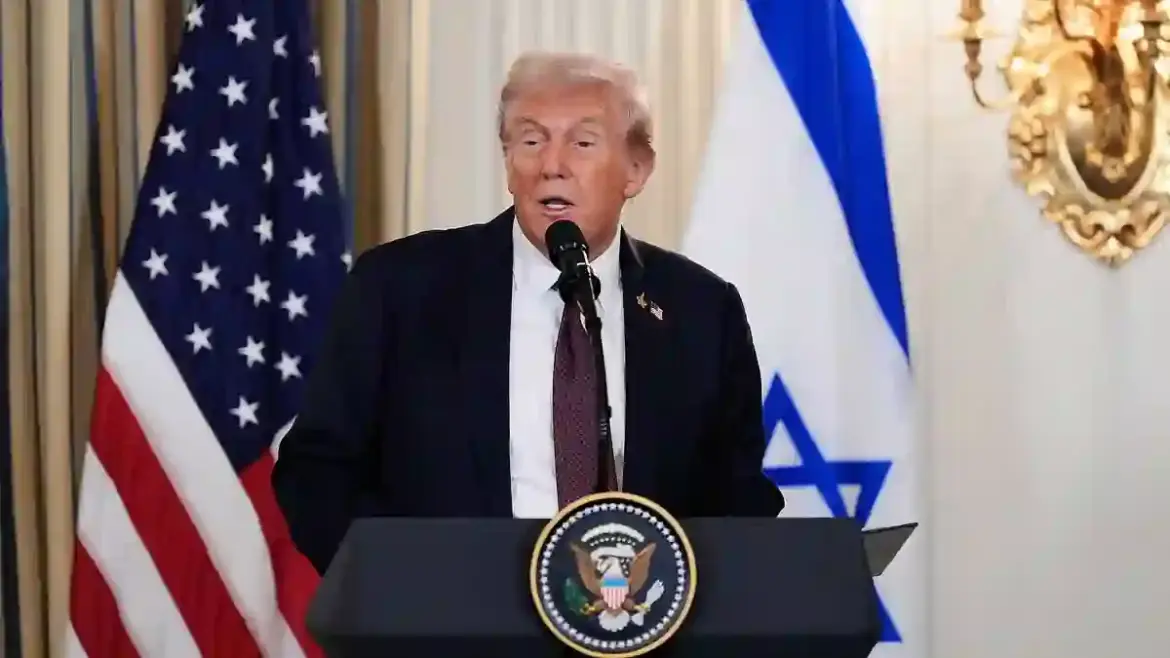In an extraordinary press conference tonight, US President Donald Trump praised Israeli Prime Minister Benjamin Netanyahu for reportedly agreeing to a peace plan aimed at ending the war in Gaza.
Describing the moment as “a big day, a beautiful day, potentially one of the greatest days ever in civilisation,” Trump outlined the ambitious 20-point roadmap designed to stabilize the region.
The plan, which has been circulated to key Arab leaders, envisions a temporary international transitional body led by former British Prime Minister Sir Tony Blair to oversee Gaza during the initial post-conflict period.
Key Elements of the 20-Point Peace Roadmap
Trump explained that the plan calls for an immediate ceasefire, followed by the disarmament of Hamas and the gradual withdrawal of Israeli forces.
A temporary international stabilization force would be deployed to ensure security, while a transitional authority, headed by Trump himself, would manage governance in Gaza.
Hamas militants would be required to disarm completely and would be excluded from any future government roles.
However, those who agree to “peaceful co-existence” would be granted amnesty.
Once Israeli troops withdraw, borders would be reopened to allow humanitarian aid and economic investment.
Significantly, Palestinians would not be forced to leave their homes.
The plan emphasizes providing opportunities to rebuild Gaza and improve living conditions for its residents, marking a notable shift from some previous approaches.
Trump Credits Team and Expresses Optimism
Trump praised the work of his team, including son-in-law Jared Kushner, in crafting the peace proposal.
“I don’t think anybody else could have done it or even come close,” he said.
While Hamas has yet to formally approve the plan, Trump expressed cautious optimism, saying all sides are “beyond very close” to agreement.
The roadmap also links Israeli troop withdrawals to the release of hostages held by Hamas, aiming to ensure a coordinated and peaceful transition.
Challenges Ahead with Netanyahu and Regional Leaders
While Trump appeared confident, Netanyahu’s recent statements at the UN suggest potential hurdles.
The Israeli premier vowed to “finish the job” against Hamas and has rejected the idea of Palestinian statehood, complicating prospects for immediate progress.
Trump has also publicly expressed frustration with Israel’s recent strike on Hamas members in Qatar and warned Netanyahu against annexing parts of the West Bank, a move supported by some far-right cabinet members in Israel.
These internal dynamics could pose challenges for implementing the peace plan.
Trump Pushes Forward Despite Obstacles
Despite these tensions, Trump has engaged with Arab leaders over the past week, emphasizing broad regional support for the initiative.
Posting on social media, he declared that “ALL ARE ON BOARD FOR SOMETHING SPECIAL, FIRST TIME EVER.”
As the roadmap moves forward, Trump is positioning the plan as a historic opportunity to stabilize Gaza and create a lasting framework for peace in the region.
